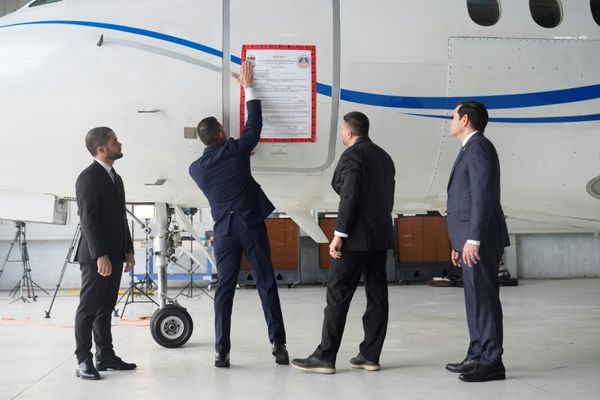
If you’re labouring under any illusion that Qantas has changed from the abusive, gouging monopolist that holds its customers and workers in contempt, get a hold of its response to the government’s lame aviation green paper and behold the drivel it is peddling as a serious contribution to public policy.
The green paper broadly hews to Labor’s pro-Qantas line, but the state of competition in aviation in Australia is now so awful that even the paper acknowledged big problems. The “domestic aviation sector is highly concentrated, with few market participants”, it says, characterised by “airlines no longer competing ‘head to head’ and focussing on market niches”. This “could adversely impact consumers and businesses that rely on aviation”.
Not true, says Qantas in its response. In fact, aviation is highly competitive. “A concentrated market does not necessarily equate to a lack of competition,” Qantas insists. “There are now four large jet operators, with Regional Express expanding onto mainline routes and the entry of Bonza … Qantas and Jetstar continue to closely monitor changes to the Regional Express and Bonza operating models (along with Virgin Australia’s) and respond appropriately.”
Bonza has five planes and doesn’t fly to Sydney, because it can’t get slots. Qantas has 125 planes and hoards slots at Sydney Airport. Bonza just had to cancel flights because it couldn’t get approval to lease two more planes. But, yep, Bonza is exerting competitive pressure on Qantas. Sure thing.
Qantas continues to deny the reality of its slots-hoarding. It says if you want more slots at Sydney, get rid of the curfew. “The Qantas Group notes that the Harris review [a review of slots management by former Productivity Commission chair Peter Harris] had a limited scope and that the 80 movement cap, Sydney Airport curfew and broader Sydney basin were explicitly out of scope. This was a missed opportunity. A comprehensive review addressing known operational challenges and efficiency gains cannot be properly conducted without engaging with these issues.”
But it’s the green paper’s mild flirtation with greater consumer protections that has the airline exercised, reflecting its status as the most complained-about company in the country. As with competition, everything is just fine in consumer protection, Qantas says. It certainly doesn’t want any additional aviation-specific safeguards for consumers. “The whole-of-economy application of the Australian consumer law represents best practice and has been identified as one of its key strengths,” Qantas says. “Its simplicity ensures that no matter what the product or service, consumers are clear about their rights and recourse.”
Simplicity? Clarity? You can imagine how Qantas’ corporate relations scribes giggled as they wrote this. This is the airline that responded to the Australian Competition and Consumer Commission’s (ACCC) allegations that it sold tickets to huge numbers of flights it had no intention of ever flying by saying it didn’t sell tickets to flights, it sold “bundles of rights”. Qantas “does not guarantee particular flight times or its flight schedules,” it told the ACCC. It doesn’t even promise to make “reasonable endeavours to operate any particular flight”. But, sure, consumers are clear about their rights and recourse!
What really worries Qantas, though, is the prospect that the government might consider European Union-style compensation requirements for delayed or cancelled flights — for which Qantas has an abysmal record. The EU requirement is called EU261 and, according to Qantas, doesn’t work. “The scheme hasn’t led to a reduction in the amount of disruption. As [the International Air Transport Association] noted in June 2023, the commission’s own data shows that disruptions have increased since EU261 was introduced.”
Except that’s a bald lie from what is the international lobby group for airlines. According to a peer-reviewed paper by German and Polish economists published earlier this year, EU261 quantifiably does work: “Regulated flights are 5% more likely to arrive on time, and mean arrival delay is reduced by almost four minutes. The effect is strongest on routes with little competition, and for legacy carriers. Thus, consumer rights can improve quality when incentives from competition are weak.”
That’s a frightening conclusion for Qantas: given the lack of competition it faces, the evidence shows a compensation requirement would lead to a noticeable improvement in on-time performance.
As for the much-criticised airline-funded and controlled customer complaints scheme, the Airline Customer Advocate (ACA), which the green paper noted didn’t provide a “low-cost, accessible legal process which can ensure passengers can access fair treatment”, Qantas thinks that, too, is fine. Why? They are “refreshing the Airline Customer Advocate’s website to enhance its functionality and simplicity”. Also, they’re actually going to do a review of the ACA’s performance, and airlines have made “a renewed commitment to improving response timeframes” (note the “renewed” — they’ve committed to improve timeliness before, but failed).
Under no circumstances should the government consider an independent airline ombudsman, Qantas says. Too expensive. And notoriously slow. And probably wouldn’t have a “refreshed” website.
And what about access for the disabled? Does Qantas support any reforms that would see an end to Qantas wheelchair-using passengers being dropped from their wheelchairs and being forced to crawl to their seats, or forcing passengers to stay on a plane and go back to where they came from because Qantas refuses to disembark them at their destination, breaking customers’ wheelchairs, leaving passengers on planes because they can’t get their wheelchair, or threatening disabled customers with the AFP if they complain?
Again, nothing to see here. There’s no need for any reform, and existing exemptions for airlines need to stay in place. Any changes should recognise it’s all very expensive to transport people with special needs — “some customers require significant assistance to be able to travel which involves additional equipment, resourcing and operational/safety considerations”.
In fact, the only area in aviation that needs any substantial reform is the airport owners. “As effectively unregulated monopoly infrastructure, many Australian airports have a track record of using their market power, with the current regulatory regime providing no constraint on monopoly behaviour or providing any incentive to lower costs or improve quality.”
An unregulated monopoly using its market power without any incentive to lower costs or improve quality. Qantas certainly knows all about that.
Are you surprised by Qantas’ response to the government green paper? Do you plan to hop on board the flying Kangaroo any time soon? Let us know your thoughts by writing to letters@crikey.com.au. Please include your full name to be considered for publication. We reserve the right to edit for length and clarity.







